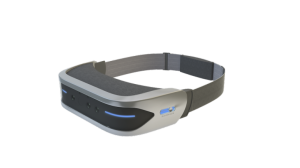The MindLeap virtual reality game system runs on your brainwaves — no controllers needed
 Neurotechnology company MindMaze announces a thought-powered virtual reality game system called MindLeap today. Based on its proprietary system originally developed for use in the medical field, MindLeap detects brain and muscle activity, using mind power along with motion-capture cameras for gameplay in both virtual and augmented reality.
Neurotechnology company MindMaze announces a thought-powered virtual reality game system called MindLeap today. Based on its proprietary system originally developed for use in the medical field, MindLeap detects brain and muscle activity, using mind power along with motion-capture cameras for gameplay in both virtual and augmented reality.The Switzerland-based company rides the towering VR wave led by Facebook’s Oculus with today’s accompanying announcement that it closed an $8.5 million angel-funding round, which it will use to build on its efforts in the medical field, where its technology accelerates recovery in patients with neurological deficits. It plans to bring this brain-powered virtual reality control to gamers for the first time with MindLeap.
MindMaze says that this system introduces a new way for players to experience the games they already know. The head-mounted display that contains the “NeuroGoggles” and 3D motion cameras should be available in the coming months. This controller-free, brain-powered, latency-free VR will be available on multiple game platforms, including the Xbox and PlayStation (though MindLeap wouldn’t say if it meant the PlayStation 4 and Xbox One or older systems), iOS, and Android.
Initially, MindMaze developed the technology for the rehabilitation purposes. Tadi shared a demonstration of a patient that had just lost his left arm and suffered from phantom pain. By tracking the brain signals that would have that missing limb move, and by displaying a corresponding visual representation of the moving missing limb, patients would be relieved of their phantom pains. But this only works in a latency-free experience — one that comes in at 20 milliseconds or less. MindMaze’s work on this front eventually led it to gaming.
The idea behind MindLeap is that it would combine this brain wave-tracking element with existing virtual reality and augmented reality technology to create a gaming platform with a new dimension of control.
Pages
- About Philip Lelyveld
- Mark and Addie Lelyveld Biographies
- Presentations and articles
- Tufts Alumni Bio